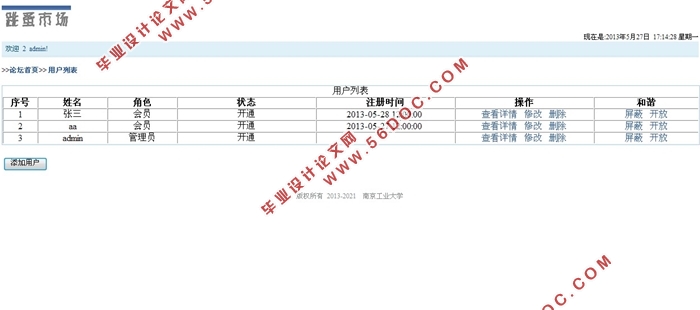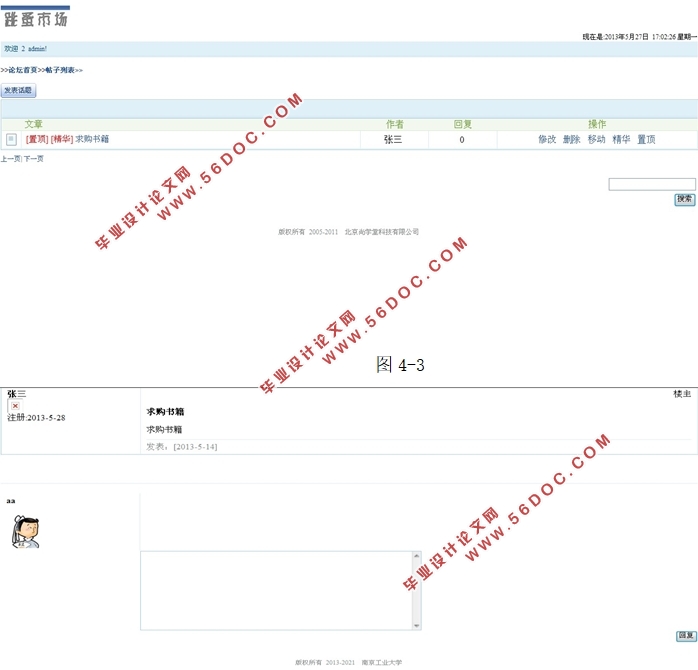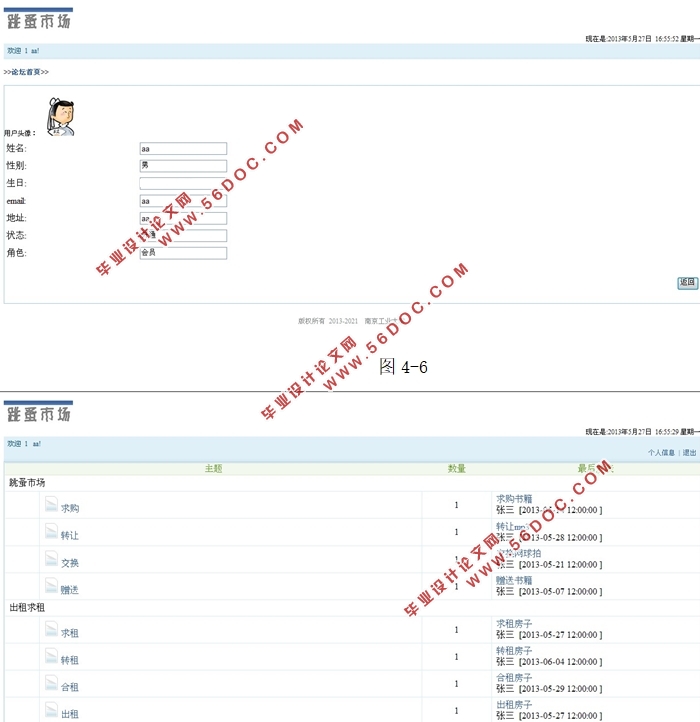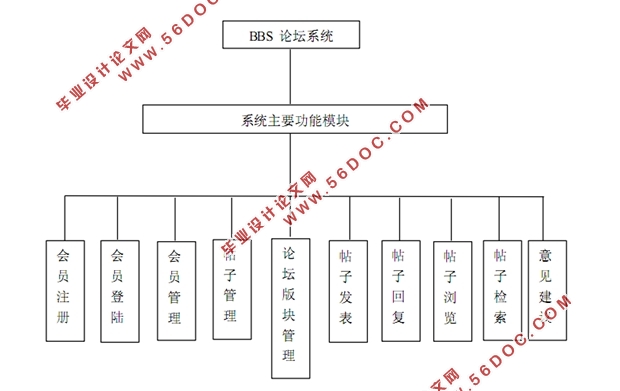基于Javaweb的大学跳蚤市场主题论坛BBS的设计(MySQL)(论文9000字,程序代码)
摘要
如今,中国网络跳蚤市场的交易量很大,然而,跳蚤市场的管理却依然混乱,信息也很杂乱。主题类的论坛,能够吸引真正有需求的人一起来交流探讨,有利于信息的分类整合和搜集,同时,针对不同的客户,可以查找不同的信息,对于求购和出售者都很方便,在信息社会,信息的管理显得尤为重要。在中国这样的网络环境下,做主题类的论坛避免了和其他论坛的竞争,而做高校跳蚤市场主题论坛,在国内更是少有,在资源如此紧缺的社会,高校跳蚤主题论坛顺应而出。
南工大跳蚤市场主题论坛是 基于 Java Web,采用面向对象的分析和设计方法,运用统一建模语言(UML) 建模,We b 应用系统开发采用JSP 技术,后台数据库则采用MySql数据库,系统基于 B/S 模式实现。主要功能模块为:新会员注册,登入,发帖,回帖;管理员的帖子管理,用户管理;游客的浏览帖子。
关键词:BBS Web 开发 动态网页技术 面向对象
The BBS Base on java——Case in flea markets
Abstract
Nowaday, the Chinese internet flea market trading volume is large, however, is still chaotic flea market management, the information is also very messy. Theme class forum can attract real needs of people together to exchange and discuss the classification of information is conducive to integration and to collect the same time, for different customers, you can find different information, for those who buy and sell very convenient, in the information society, information management is particularly important. In China such a network environment, do the theme class forum and other forums to avoid competition, while doing college flea market theme of the Forum, it is rare in the country, so the shortage of social resources, universities follow out fleas Topic Forum .
Southern Engineering Forums large flea market is based on Java Web, using object-oriented analysis and design methods, the use of Unified Modeling Language (UML) modeling, We b application development using JSP, MySql database backend database is used, the system based on B / S mode implementation. Main function modules: Register, login, post replies; administrator posts management, user management; visitors browsing posts.
Key Words :BBS; Web development; Dynamic web technology; Object-oriented
需求分析
这个跳蚤市场的论坛主要满足3种用户使用,游客可以浏览帖子,会员可以浏览帖子,发表帖子,回复帖子和修改自己信息,而管理员的权限则更大,可以修改版块,修改帖子,屏蔽帖子,修改用户信息等功能。




目 录
摘要 I
Abstract II
目 录 III
第一章 引言 1
1.1 研究背景 1
1.2 国内外研究现状、发展动态 1
1.3本文研究意义 2
1.4研究内容 2
1.5研究思路与方法 4
1.5.1 研究思路 4
1.5.2 研究方法 4
第二章 系统分析 6
2.1 可行性分析 6
2.1.2 技术可行性 6
2.1.3 外在可行性 7
2.2 需求分析 7
2.2.1用户需求(三类用户) 7
2.4系统功能分析 7
2.4.1系统功能模块图 7
2.4.2功能界面框图 9
2.4.3功能描述 9
第三章 UML建模 11
3.1 系统静态建模 11
3.1.1 用例模型 11
3.1.2 系统类图 13
3.2 系统动态建模 13
第四章 系统设计 15
4.1 设计目标 15
4.2 开发及运行环境 15
4.3 数据库设计 15
4.3.1 数据表 15
4.3.2 主要数据表结构 18
4.4 用户界面设计 18
第五章 系统扩展功能及推广 22
5.1 网站的分享 22
5.1.1意义 22
5.1.2实现代码 22
5.2 二维码推广 22
5.2.1 意义 22
5.2.2 原理 23
5.2.2实施 23
5.3微信服务 24
5.3.1意义 24
5.3.2操作 24
5.4网上拍卖会 25
5.4.1操作 25
5.5 用户升级系统 25
5.5.1 意义 25
5.6 名片系统 25
5.6.1意义 25
5.6.2操作 25
5.7电子支付系统 26
5.7.1意义 26
5.7.2操作 26
结语 27
参考文献 28
致谢 29
|









